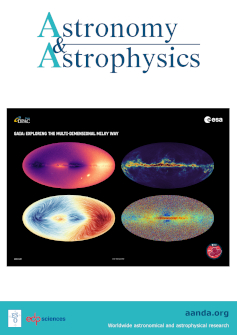宇宙正午极度贫金属气体调查
IF 5.4
2区 物理与天体物理
Q1 ASTRONOMY & ASTROPHYSICS
引用次数: 0
摘要
目的我们旨在研究宇宙正午(2 z)时贫金属气体云的高精度化学丰度。我们利用 Keck/HIRES 和 VLT/UVES 的观测数据分析了四个新发现的贫金属气体云的丰度。这些系统被归类为非常贫金属(VMP),[Fe/H] α(DLA)系统,[Fe/H] = -3.13 ± 0.06。结合之前已知的两个 EMP DLA 和文献中报道的两个系统的新高分辨率数据,我们对目前已知的八个最贫金属气体云进行了全面分析。我们重点利用以下元素进行了高精度丰度测量:结果。我们的研究结果表明,当[Fe/H] cen = +0.50 ± 0.04,σint[O/Fe] = 0.13-0.04+0.06的内在散度时,[O/Fe]丰度升高的证据越来越多。而 VMP DLAs 的模型较好,[O/Fe]cen = +0.40 ± 0.02,σint, [O/Fe] = 0.06 ± 0.02。我们进一步发现了[C/O]在这些最贫金属的DLA中发生红移演化的初步证据,低红移系统显示出较高的[C/O]比值。利用测量到的丰度,结合随机化学富集模型,我们研究了在宇宙正午负责富集 EMP 气体的恒星群的性质。我们发现,这些系统的化学性质可以通过两个大质量祖星(N⋆ = 2 ± 1)的富集得到最好的解释,这两个祖星以核心坍缩SNE的形式结束了自己的生命,其典型的爆炸能量为Eexp = (1.6 ± 0.6)×1051 erg。这些原生星的形成遵循一个类似于萨尔佩特(Salpeter)的幂律IMF,在这个IMF中,所有质量大于Mmax = 32-4+10M⊙ 的恒星都直接坍缩为黑洞,而不参与金属富集。本文章由计算机程序翻译,如有差异,请以英文原文为准。
A survey of extremely metal-poor gas at cosmic noon
Aims. We aim to study the high-precision chemical abundances of metal-poor gas clouds at cosmic noon (2 < z < 4) and investigate the associated enrichment histories.Methods. We analyze the abundances of four newly discovered metal-poor gas clouds utilizing observations conducted with Keck/HIRES and VLT/UVES. These systems are classified as very metal-poor (VMP), with [Fe/H] < −2.57, and one system qualifies as an extremely metal-poor (EMP) Damped Lyman-α (DLA) system with [Fe/H] = −3.13 ± 0.06. In combination with new high-resolution data of two previously known EMP DLAs and 2 systems reported in the literature, we conduct a comprehensive analysis of eight of the most metal-poor gas clouds currently known. We focus on high-precision abundance measurements using the elements: C, N, O, Al, Si, and Fe.Results. Our findings indicate increasing evidence of elevated [O/Fe] abundances when [Fe/H] < −3. EMP DLAs are well-modeled with a mean value of [O/Fe]cen = +0.50 ± 0.04 and an intrinsic scatter of σint[O/Fe] = 0.13-0.04+0.06. While VMP DLAs are well-modeled with [O/Fe]cen = +0.40 ± 0.02 and σint, [O/Fe] = 0.06 ± 0.02. We further find tentative evidence of a redshift evolution of [C/O] across these most metal-poor DLAs with lower redshift systems showing elevated [C/O] ratios. Using the measured abundances, combined with a stochastic chemical enrichment model, we investigate the properties of the stellar population responsible for enriching EMP gas at cosmic noon. We find that the chemistry of these systems is best explained via the enrichment of just two massive progenitors, N⋆ = 2 ± 1, that ended their lives as core collapse SNe with a typical explosion energy Eexp = (1.6 ± 0.6)×1051 erg. These progenitors formed obeying a Salpeter-like power-law IMF, where all stars of mass greater than Mmax = 32-4+10M⊙ collapse directly to black holes and do not contribute to the metal enrichment.
求助全文
通过发布文献求助,成功后即可免费获取论文全文。
去求助
来源期刊

Astronomy & Astrophysics
地学天文-天文与天体物理
CiteScore
10.20
自引率
27.70%
发文量
2105
审稿时长
1-2 weeks
期刊介绍:
Astronomy & Astrophysics is an international Journal that publishes papers on all aspects of astronomy and astrophysics (theoretical, observational, and instrumental) independently of the techniques used to obtain the results.
 求助内容:
求助内容: 应助结果提醒方式:
应助结果提醒方式:


